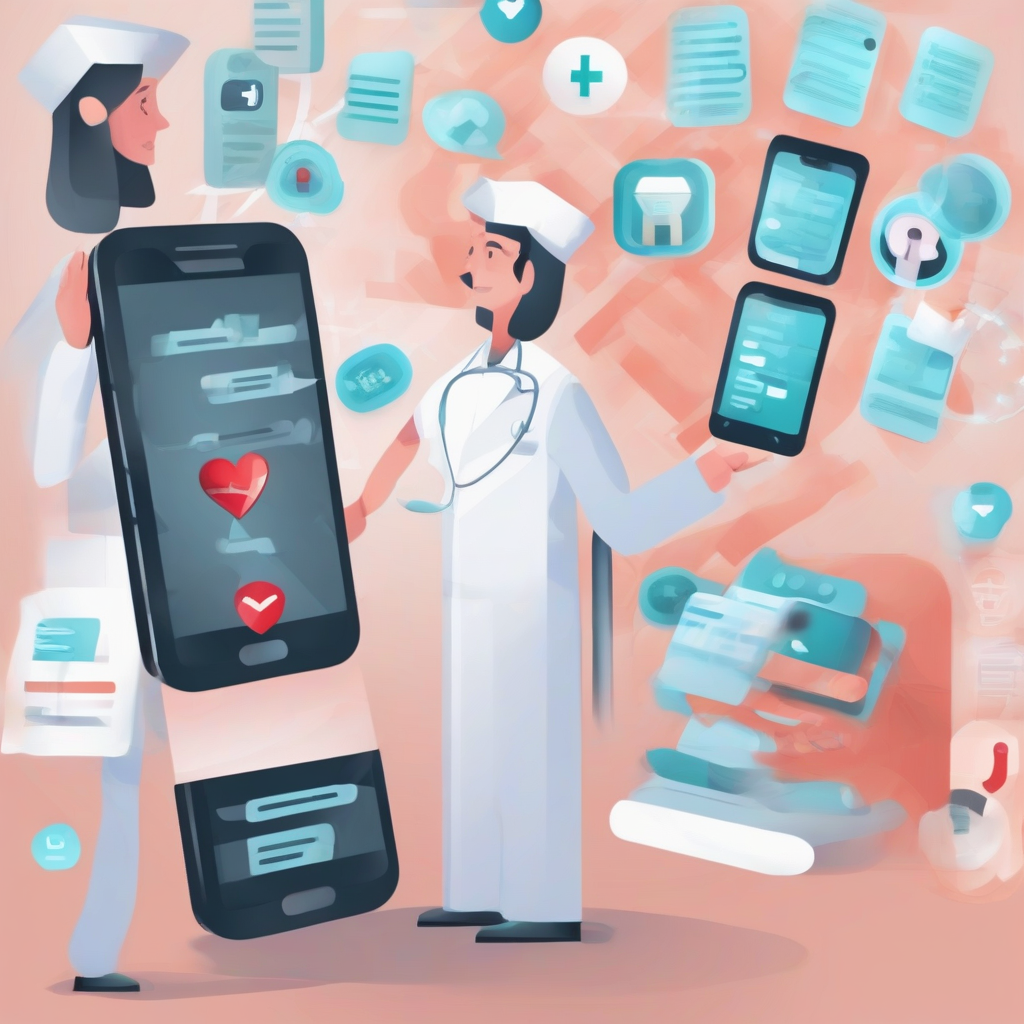Revolutionizing Healthcare: The Impact and Future of Mobile Apps
The healthcare industry is undergoing a significant transformation, driven largely by technological advancements. Among these, mobile applications (apps) have emerged as a powerful tool, impacting various aspects of healthcare delivery, from patient engagement to clinical decision-making. This exploration delves into the multifaceted role of mobile apps in the healthcare sector, examining their benefits, challenges, and future potential.
Enhanced Patient Engagement and Empowerment
Mobile apps are revolutionizing patient engagement by providing readily accessible information and tools that empower individuals to take control of their health. This increased engagement translates to improved health outcomes and reduced healthcare costs.
- Medication Reminders and Management: Apps can send timely reminders for medication intake, track adherence, and provide information about potential side effects, leading to better medication compliance.
- Appointment Scheduling and Management: Patients can easily schedule, reschedule, and manage appointments through dedicated apps, reducing no-shows and improving clinic efficiency.
- Health Monitoring and Tracking: Wearable technology integration allows patients to track vital signs (heart rate, blood pressure, sleep patterns), activity levels, and dietary intake, providing valuable data for personalized care.
- Symptom Tracking and Reporting: Apps can assist patients in tracking symptoms, recording their severity, and providing this data to their healthcare providers, facilitating early diagnosis and intervention.
- Telehealth and Remote Monitoring: Apps facilitate virtual consultations, remote patient monitoring, and access to healthcare professionals, particularly beneficial for patients in remote areas or with limited mobility.
- Educational Resources and Support: Apps provide access to reliable health information, educational materials, and support communities, empowering patients to make informed decisions about their health.
Improved Healthcare Provider Efficiency and Workflow
Mobile apps are not only beneficial for patients but also enhance the efficiency and workflow of healthcare providers. Streamlining administrative tasks and improving communication contribute to a more effective healthcare system.
- Electronic Health Records (EHR) Access: Secure mobile access to EHRs allows healthcare providers to access patient information anytime, anywhere, improving the speed and accuracy of diagnosis and treatment.
- Clinical Decision Support Systems (CDSS): Apps can provide healthcare professionals with real-time clinical decision support, aiding in diagnosis, treatment planning, and medication prescription.
- Communication and Collaboration Tools: Secure messaging platforms within apps allow healthcare providers to communicate effectively with each other and with patients, streamlining communication and reducing errors.
- Administrative Task Management: Apps can automate administrative tasks such as appointment scheduling, billing, and insurance verification, freeing up providers’ time for direct patient care.
- Medical Imaging and Diagnostics: Apps can facilitate remote access to medical images and diagnostic reports, allowing for faster consultations and quicker treatment decisions.
Transforming Specific Healthcare Areas
The impact of mobile apps extends across various healthcare specialties, offering tailored solutions to address specific needs and challenges.
- Mental Health: Apps provide access to mental health resources, support groups, and cognitive behavioral therapy (CBT) programs, addressing the growing mental health crisis.
- Chronic Disease Management: Apps help patients manage chronic conditions like diabetes, hypertension, and asthma by tracking vital signs, providing medication reminders, and offering educational resources.
- Cancer Care: Apps support cancer patients throughout their treatment journey, offering information about their diagnosis, treatment options, and side effect management.
- Pharmaceutical Industry: Apps are used for drug discovery, clinical trials management, patient recruitment, and post-market surveillance.
- Medical Research: Apps facilitate data collection for clinical trials and research studies, making it easier to gather large amounts of data efficiently.
Challenges and Considerations
Despite their numerous benefits, the adoption and implementation of mobile health apps face several challenges.
- Data Security and Privacy: Protecting sensitive patient data is crucial, and ensuring compliance with data privacy regulations is essential.
- Interoperability and Integration: Seamless integration of mobile apps with existing healthcare systems is crucial for effective data exchange and workflow efficiency.
- Regulatory Compliance: Meeting regulatory requirements for medical devices and software is essential for ensuring the safety and efficacy of mobile health apps.
- Accessibility and Digital Literacy: Ensuring that apps are accessible to all patients, regardless of their technological skills or socioeconomic status, is vital.
- Cost and Sustainability: Developing, implementing, and maintaining mobile health apps can be expensive, requiring careful consideration of cost-effectiveness.
- User Experience and Engagement: Designing user-friendly and engaging apps is critical for ensuring patient adoption and adherence.
The Future of Mobile Apps in Healthcare
The future of mobile apps in healthcare is bright, with ongoing advancements promising even greater impact. Artificial intelligence (AI), machine learning (ML), and the Internet of Things (IoT) will further transform the capabilities of these apps.
- AI-Powered Diagnostics and Treatment: AI algorithms will enhance diagnostic accuracy and personalize treatment plans based on individual patient data.
- Predictive Analytics and Risk Stratification: ML algorithms will analyze patient data to predict health risks and personalize preventive interventions.
- Remote Patient Monitoring with IoT Devices: Integration with IoT devices will enable continuous and real-time monitoring of patient health status, allowing for early intervention and improved outcomes.
- Personalized Medicine and Precision Healthcare: Mobile apps will play a key role in delivering personalized medicine by tailoring treatments and interventions based on individual genetic and lifestyle factors.
- Enhanced Telehealth Capabilities: Further advancements in telehealth will expand access to remote healthcare services and improve the quality of care for patients in underserved areas.
- Blockchain Technology for Secure Data Management: Blockchain technology will enhance data security and privacy by providing a secure and transparent platform for sharing patient information.
In conclusion, mobile apps have already significantly impacted the healthcare industry, enhancing patient engagement, improving provider efficiency, and transforming specific healthcare areas. While challenges remain, the future potential of these apps is vast, promising a more personalized, efficient, and accessible healthcare system for all.
